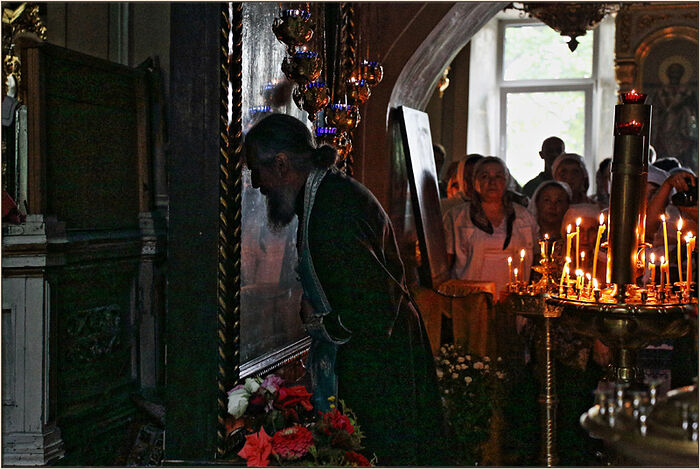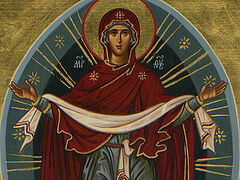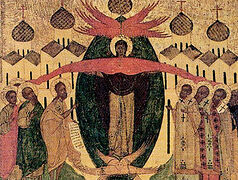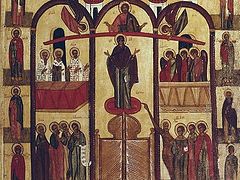“Today the Virgin stands in the church, and with hosts of saints, invisibly prays to God for us” (Kontakion of the feast).
This prayerful presence of the Mother of God and the saints before God reminds us, brethren, that we, members of the earthly Church, can and must be in the most lively communion with the members of the Heavenly Church. Visibly removing themselves from the world during their earthly life and leaving the earth as a place of painful exile for them, the saints never separated themselves from communion with men. They didn’t take part in the typical worldly, vain cares, but people’s spiritual needs were always close to them. They even loved people more than people living in the world love each other.
And this love of theirs was expressed especially in spiritual counsels, which they never refused for those who sought them, or in their writings. And even if they completely withdrew into the desert, even then they prayerfully sighed and mourned for their brethren in the world. Having left this earthly life, they intensified their prayerful intercessions to God for peace all the more. The seer of mysteries St. John the Theologian saw in revelation how the prayers of the saints were lifted up with incense before God, thus averting the calamities threatening the world (Rev. 8:3-5).
And perhaps their prayers and those of holy ascetics who are unknown to the world but haven’t yet left this earthly life are of more importance than the loud and well-known deeds of those of us who consider ourselves useful laborers for the good of mankind. For we are only “laborers” in the “field of God,” while only God can cultivate what we labor over (1 Cor. 3:5-6; Jn. 4:35, 38; Mt. 9:38). He looks first of all not at the visible greatness of human works, but at the inner disposition of the spirit of the laborers.
But what thoughts and feelings does the contemplation of the saints’ prayerful intercession for us before God cause in us? Are many of us filled with joy that we have come unto Mount Sion, and unto the city of the living God, the Heavenly Jerusalem, and to an innumerable company of angels, To the general assembly and Church of the firstborn, which are written in Heaven (Heb. 12:22-23)? Do many have faith such that our communion with the Heavenly Church would be not only mental, but also real and tangible, as it were? Doesn’t it happen, on the contrary, that we actually hold onto the ideas of those who don’t yet clearly know about the future life, thinking that when man descends into the underworld, he’s departed on a path of no return, and his place shall not know him any more, as an infant which never saw light (Job 7:10, 3:16)?
And if the saints, filled with love for everyone, haven’t abandoned their communion with the earthly Church, but are aware of all our needs and spiritual infirmities, then do we seek communion with them ourselves? For communion must be mutual. Can we say that striving for communion with them is as pleasant and joyful for us as it is with the people we love on earth, considering spending time and talking with them a joy, and imitating them?
On the contrary, isn’t it usually the case that we’re ready to treat the feats of the saints, yes, with respect, but without considering them something to be desired or something to be imitated? We think that other types of occupations and activities for the good of society await us, and we remain confident that we can be in communion with the Heavenly Church without having the inner disposition of the spirit of holy people. Considering the feats of the saints necessary only for them, we stop considering their help necessary for us. But even if we’re capable, or at least consider ourselves capable of arranging our earthly affairs, can we do without the help of the saints in the spiritual life—in the battle with our passions, with bad habits, even insignificant ones, with the slightest movement of anger, in expelling egotism from our hearts and in learning works of love?
Thus, brethren, desiring to be living and active members of the Heavenly Church, let us first of all try to acquire a simple and humble faith in the intercession of the saints, for the unseen prayerful intercession of the saints is contemplated only through the spiritual eye of faith, and God giveth grace unto the humble (Jas. 4:6). In simplicity and humility of heart, those who resort to the prayers of the saints, especially to the Mother of God before her icons, which are everywhere glorified by miracles, will never be ashamed in their hope, but will receive ever-present help. And if, brethren, in traversing the path of our life, we have resorted to the Mother of God and the saints with the same faith and humility of heart for which He that is mighty hath done to [her] great things such that all generations shall call [her] blessed (Lk. 1:48-49), then her holy veil, spread out over the world, will become as if tangible for us.
Amen.





